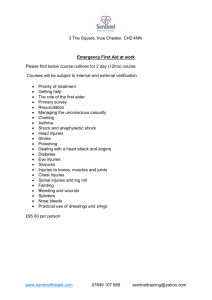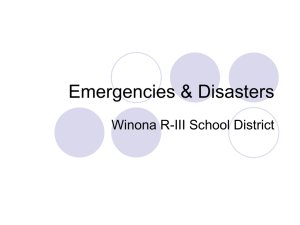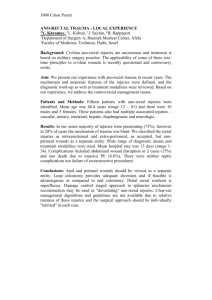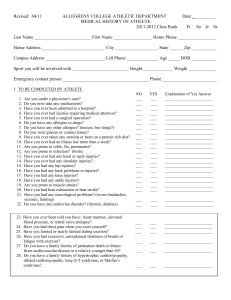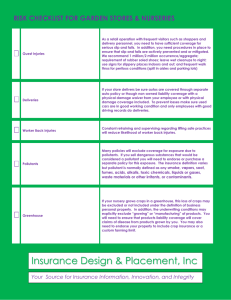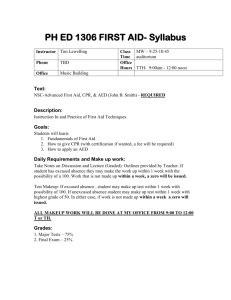ACCESS TO:- MINOR INJURIES DEPARTMENT WAST SOP MINOR
advertisement
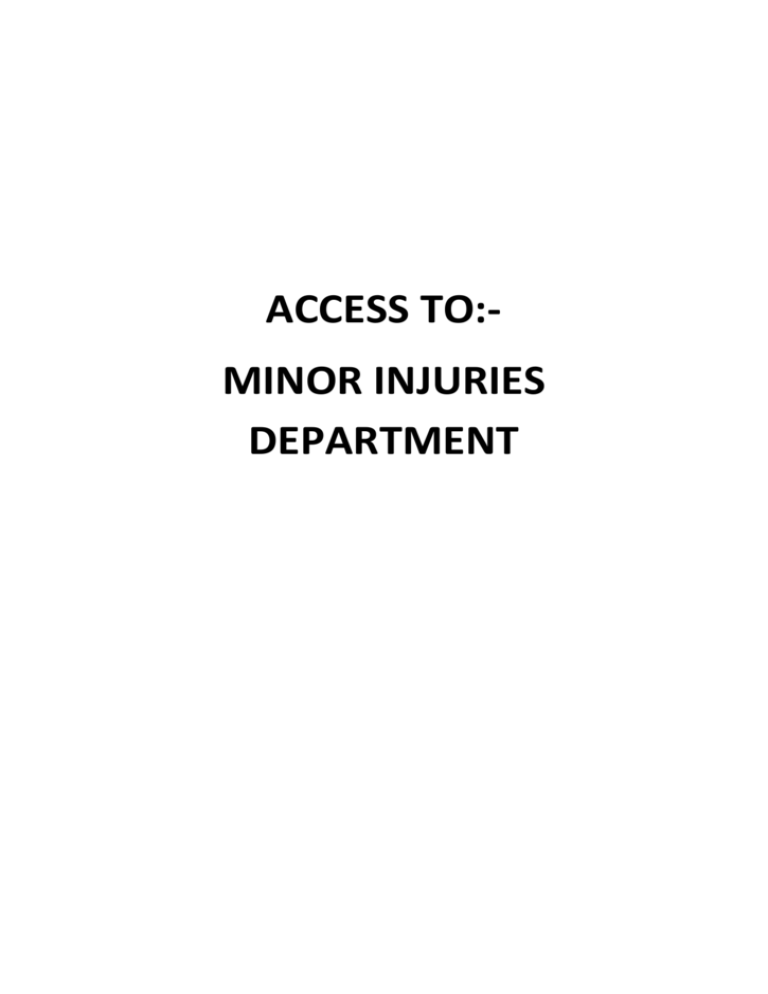
ACCESS TO:MINOR INJURIES DEPARTMENT WAST SOP MINOR INJURY UNIT ACCEPTED INJURIES Excluded Criteria -provided no excluded criteria ( Children under 1, under 12 years in severe pain or those suspected of NAI) Abdominal injury All Assaults Specific injuries that meet any other exclusions in this Back injury document e.g. head injury Sexual assaults Specific injuries that meet any other exclusions in this document e.g. RTC or Head Injury High risk for significant injury e.g. fall/Jump from height, significant hyperextension injury Not directly linked to trauma Bowel or bladder involvement Paraesthesia or neurological deficit to limbs Bony tenderness to spine Exotic animal or insect bites e.g. spider, snake : Bites or stings Burns Symptoms or injuries that meet any other exclusions in this document > 3% BSA Electrical / inhalation/ perineal burns mouth or lips burns Full circumferential burns which have blistering or are white & non-blanching Burns to face, head or trunk with blistering or are white & nonblanching in children < 12 years All Chest or Truncal Injuries Ear injury Eye injury only Facial injury also review head /neck injury exclusions Falls Foreign bodies Wound through cartilage Penetrating injury Associated with perforated ear drum: actual or potential Complete loss of vision since injury in one or both eyes Penetrating injury, blood or pus visible in anterior chamber Wounds crossing eyelid margin Wounds affecting tear ducts or epicanthus Wounds to eyelid between eyelashes & orbit margin Obvious bony deformity Associated uncontrolled epistaxis Open fracture nose wounds over vermillion border of lip Specific injuries that meet any other exclusions in this document e.g. head or neck injuries From > 5 steps or stairs or equivalent as considered as major trauma meet any other exclusions in this document e.g. airway or breathing Head injury rectal FBs sexual assault Meet any other exclusions in this document e.g. neck or facial injuries GCS < 15/15 at any time before or after injury Amnesia before or after injury Vomiting before or after injury Seizures since injury Obtunded by drugs or alcohol Suspicion of skull fracture History of bleeding or clotting disorder Drug history of anticoagulant therapy Signs of Otorrhoea / Rhinorhoea / Panda eyes / Battles signs Poor communications skills e.g. deaf, dementia, severe learning disabilities Associated with severe headache or headache not relieved by simple analgesia All Hip/ groin injuries Limb Injury Dislocated major joints: shoulder, elbow, wrist, hip, knee, Mouth Injuries Neck injuries ankle Deformed limbs Limb with neurovascular deficit Femur, hip or pelvis injury Injuries that meet any other exclusions in this document e.g. head injury & wounds Wounds crossing vermillion border Injuries that meet any other exclusions in this document e.g. head or facial injuries Quad bike, motor bike or bicycle injury Poor communications skills e.g. deaf, dementia, severe learning disabilities PMH: ankylosing spondylitis / rheumatoid arthritis / osteoparosis PMH: previous c/spine surgery or disease Injury caused by Axial loading Paraesthesia to upper limbs Neurological deficit to upper limbs Significant distraction injury [major long bone fractures] All Pelvic injuries inc sacrum RTCs or transport Injuries Specific injuries that meet any other exclusions in this document e.g. head, neck, mouth or limb injuries Severe crush injuries High speed injuries i.e. > 60mph Roll over or ejection from car/ vehicle Quad bike injuries Head on collision Entrapment in vehicle Wounds Specific injuries that meet any other exclusions in this document e.g. facial, eye or head injuries Stabbings Gunshot Penetrating trauma Wounds to lips which extend over vermillion border Deep wounds where the base of wound cannot be seen or deep tissues are damaged (e.g. muscles, vessels etc) Severe crush injuries Tendon injuries Nerve injuries Ear wounds that affect cartilage Non-traumatic i.e. surgical wound problems or ulcers Wound that would require closure in theatre or under sedation e.g. very distressed child, large deep wounds, and wounds with large FBs insitu.
